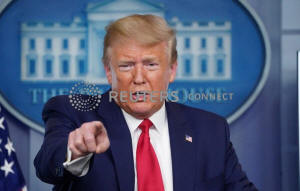Trump says OPEC has not asked him for a U.S. oil
production cut
 Send a link to a friend
Send a link to a friend
 [April 07, 2020] By
Jeff Mason [April 07, 2020] By
Jeff Mason
WASHINGTON (Reuters) - President Donald
Trump said on Monday that OPEC had not pressed him to ask U.S. oil
producers to reduce their output to support global prices, which have
been hard-hit by the economic fallout of the coronavirus pandemic.
Trump said U.S. oil production had already fallen, anyway.
"I think it's happening automatically but nobody's asked me that
question yet so we'll see what happens," the president told a press
briefing Monday afternoon.
Major oil producers including Saudi Arabia and Russia are likely to
agree to cut production at a Thursday meeting but only if the United
States joins the effort, three sources involved told Reuters on Monday.
“Without the U.S., no deal,” one of the sources said.

Worldwide oil demand has dropped by roughly 30%, or about 30 million
barrels a day as the coronavirus pandemic brings the world economy to a
standstill, at the same time that Saudi Arabia and Russia have been
flooding markets with extra supply.
That has been a major problem for the economy of the United States,
which has grown into the world's largest oil and gas producer, because
it has threatened the once-bustling drilling industry with layoffs and
bankruptcies.
Several U.S. drilling companies have already scaled back production
because of the drop in oil prices, which have lost around two-thirds of
their value so far this year.
[to top of second column] |

President Donald Trump points at a reporter as he talks about the
Department of Health and Human Services Inspector General's report
on the shortage of novel coronavirus tests for hospitals during the
daily coronavirus task force briefing at the White House in
Washington, U.S., April 6, 2020. REUTERS/Kevin Lamarque

Last week, in response to the weeks-long market rout, the Organization of the
Petroleum Exporting Countries and its allies including Russia, a group known as
OPEC+, started talking about cutting production, but they want other non-OPEC
nations to participate, particularly the United States.
The renewed discussions among members of OPEC+ began after Trump pressured
Riyadh and Moscow to make a deal in a series of phone calls. Trump said last
week he had made no concessions and did not agree to a U.S. production cut.
Normally any coordinated decision by U.S. oil producers to reduce output to
boost prices would violate antitrust laws.
But if the federal government leads the charge such an effort would arguably be
legal, according to Barbara Sicalides, an antitrust expert at Pepper Hamilton
LLP.
(Aditional reporting by Diane Bartz; Editing by Richard Valdmanis, Sandra Maler
and Sonya Hepinstall)
[© 2020 Thomson Reuters. All rights
reserved.] Copyright 2020 Reuters. All rights reserved. This material may not be published,
broadcast, rewritten or redistributed.
Thompson Reuters is solely responsible for this content.
 |